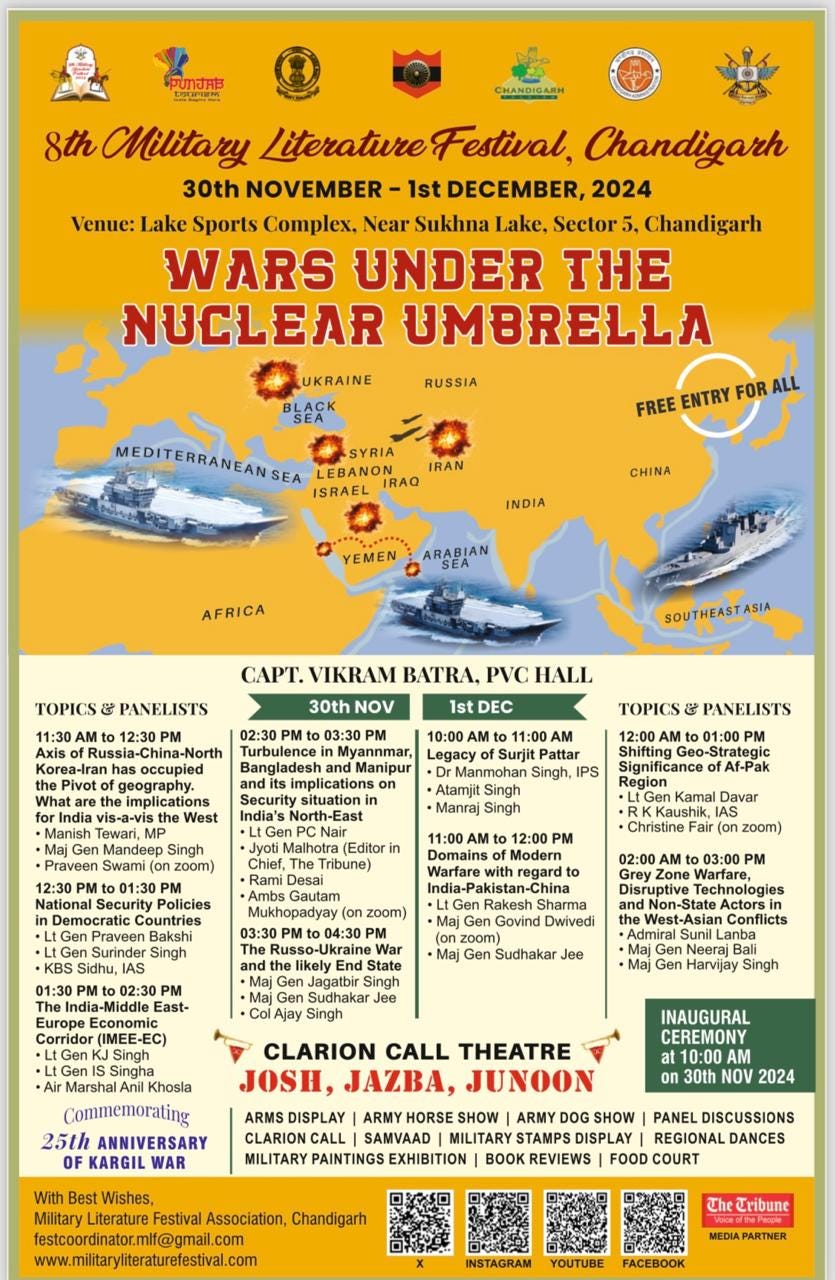National Security Policies in a Democratic Polity
Insights from the 8th Military Literature Festival, Chandigarh, 2024.
National Security Policies in Democratic Countries
On November 30, 2024, I had the privilege of participating as a panelist alongside two distinguished and highly decorated retired army generals, Lt. General Praveen Bakshi and Lt. General Surinder Singh, at the 8th Military Literature Festival in Chandigarh. The event, formally inaugurated by the Governor of Punjab, Shri Gulab Chand Kataria, served as a prestigious platform for thought-provoking discussions on national and global security challenges. Our panel delved into a topic of profound contemporary relevance: "National Security Policies in Democratic Countries."
Below, I outline the key issues and perspectives I shared during the panel.
1. Balancing National Security and Civil Liberties
Democratic nations face the perennial challenge of maintaining national security without undermining civil liberties. Drawing from India's constitutional ethos, I emphasized the importance of preserving fundamental rights, particularly under Article 21, which guarantees the right to life and personal liberty.
While security concerns are legitimate, they should not serve as a pretext to evolve into a police state. India already has robust mechanisms like preventive detention laws and the National Security Act (NSA) of 1980, which balance security imperatives with constitutional protections. However, these measures must be applied judiciously to ensure the state remains a protector, not a predator.
2. Intelligence Coordination and Reform
Effective intelligence is the backbone of any national security strategy. Yet, the lack of coordination among various intelligence agencies—state, central, and military—has historically been a weakness.
The lessons learned from the Kargil intrusion underscore the urgent need for breaking down silos and fostering inter-agency cooperation. Institutionalized frameworks for seamless communication and data sharing between organizations like R&AW, IB, and state agencies are critical to preempting threats.
3. Diplomatic and Intelligence Alignment
Diplomatic and intelligence operations often function in silos, leading to divergent approaches in handling critical national security challenges.
For instance, the activities of the so-called Khalistani anti-India elements in Canada and the USA highlight the need for better alignment between foreign service priorities and intelligence operations. Similarly, navigating complex relationships with powers like Russia and China demands a nuanced approach that integrates intelligence insights with diplomatic strategies.
4. Cybersecurity and Emerging Threats
In an increasingly digitized world, cybersecurity is a cornerstone of national security. I highlighted the necessity of both offensive and defensive cyber capabilities to protect critical infrastructure, financial systems, and even nuclear facilities.
India must also prioritize data sovereignty, ensuring that sensitive data is stored and processed within its borders. Leveraging artificial intelligence (AI) for predictive analytics and threat detection can further bolster cybersecurity defenses.
5. Cryptocurrency Challenges
Cryptocurrencies present a double-edged sword for national security. While they offer innovative financial solutions, their anonymity makes them a favored tool for terrorist financing and money laundering.
Addressing this requires a multi-pronged approach, including tracking mechanisms, international collaboration, and comprehensive regulations that go beyond mere taxation policies.
6. A Multi-Disciplinary Approach to National Security
National security is no longer the sole domain of defense forces and intelligence agencies. Modern threats demand a multi-disciplinary approach, integrating expertise from diverse fields such as technology, economics, and sociology.
Empowering teams with diverse skill sets and ensuring a 360-degree perspective in decision-making will enhance India's ability to tackle complex security challenges.
7. Updating Legal Frameworks and Policies
India's legal frameworks need to evolve to address contemporary security challenges. For instance, the rise of cyber threats and data privacy concerns necessitates updated cyber laws that align with the fundamental right to privacy.
Balancing national security measures within the constitutional framework ensures that policies remain both effective and legitimate.
8. International Cooperation and Information Sharing
Transnational threats like terrorism and cybercrime require global solutions. India must actively engage in international partnerships to enhance intelligence-sharing and joint operations.
However, collaboration must not come at the expense of national sovereignty. Mechanisms that protect sensitive information while fostering cooperation are essential.
9. Leveraging Technological Advancements
Investing in cutting-edge technologies such as AI, machine learning, and quantum computing is imperative for modernizing India's security apparatus. These tools can enhance intelligence-gathering, threat analysis, and decision-making capabilities.
At the same time, ethical considerations must guide the adoption of new technologies to prevent misuse or overreach.
10. Building Public Awareness and Trust
Public trust is critical for the success of national security policies in democracies. Transparency, where feasible, and effective communication are key to fostering public support.
Educating citizens about security challenges without compromising sensitive information ensures a well-informed populace that can contribute to a balanced security discourse. Media and civil society also play a pivotal role in shaping narratives and holding institutions accountable.
In Summary
Democratic nations like India must navigate a delicate balance between security and liberty, collaboration and sovereignty, and innovation and ethics. By adopting a holistic, multi-disciplinary, and rights-based approach, we can craft national security policies that are not only robust but also reflective of our democratic values.
The panel discussion at the 8th Military Literature Festival provided a platform to explore these pressing issues, and I look forward to continued dialogue and action on these critical challenges.



